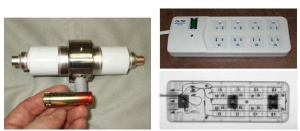Apr 24 2009
Ryoichi Suzuki, the Advanced Defect-Characterization Research Group, the Research Institute of Instrumentation Frontier of the National Institute of Advanced Industrial Science and Technology (AIST), In cooperation with Dialight Japan Co., Ltd. and Life Technology Research Institute, Inc., has developed practical portable X-ray sources with a cold-cathode electron source using carbon nanostructures.
 Main body of the developed X-ray source (left) and an X-ray transmission image (right, bottom)
Main body of the developed X-ray source (left) and an X-ray transmission image (right, bottom)
The X-ray sources use carbon nanostructures as field-emission electron sources, and can promptly generate X-rays whenever required because as it does not have a heater or a filament, it does not require preheating. As energy is consumed only while X-ray are being generated, X-rays with an energy of >100 keV--the level needed in nondestructive inspection or medical diagnostics--can be generated from dry butteries or a USB power source. The technology also is applicable to an electron beam with a power of >10 kW generating X-rays for ultrahigh-speed imaging, which contributes to new applications that require ultra-rapid X-ray inspection.
The result of the study will be published at the "Symposium on Advanced Material and Nondestructive Measurement Technology for Realizing a Safe and Secure Society" to be held from March 24 to 25, 2009.